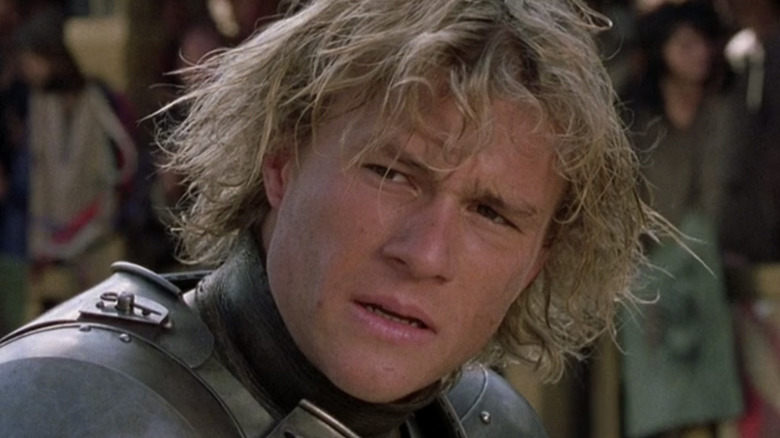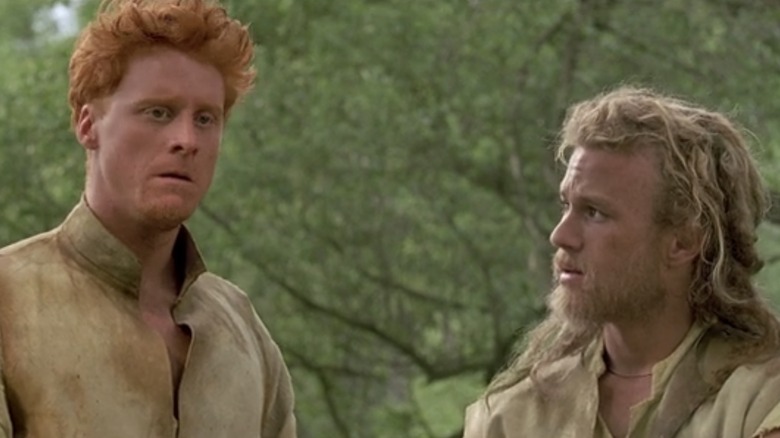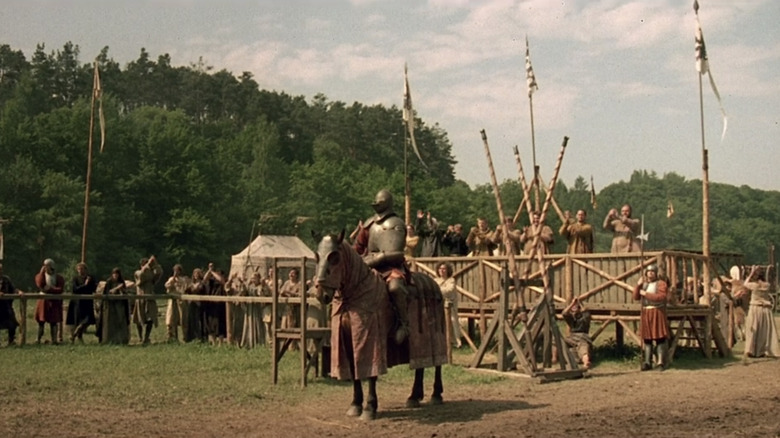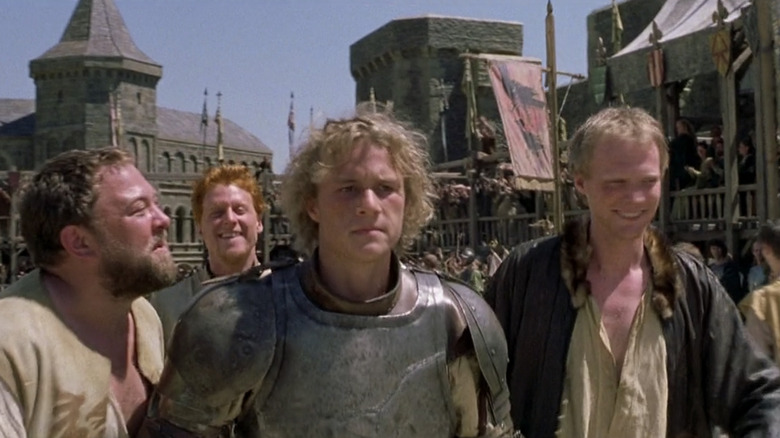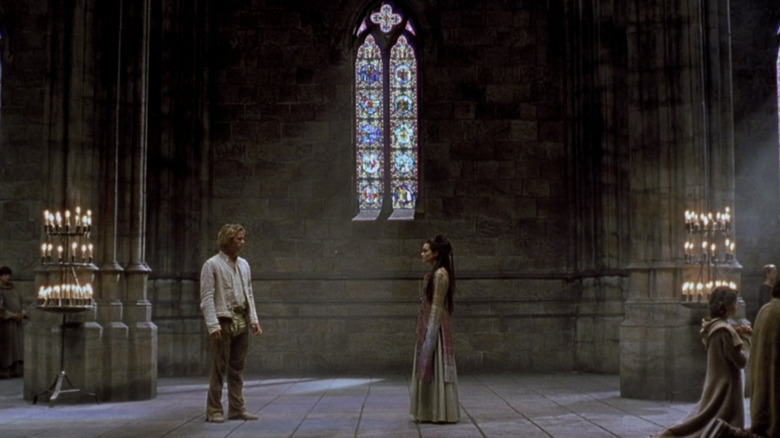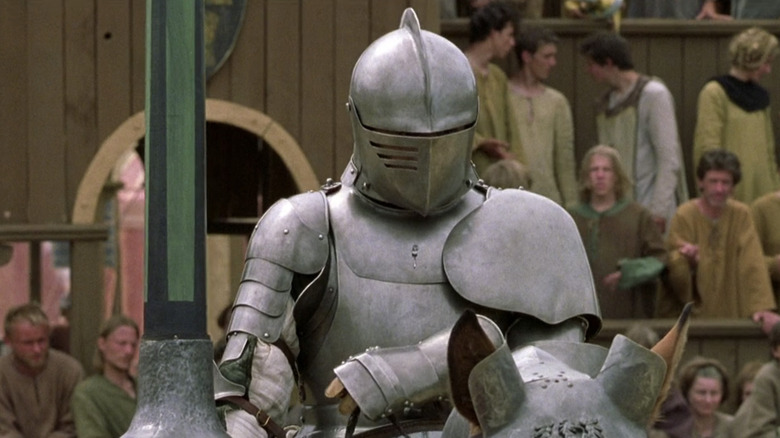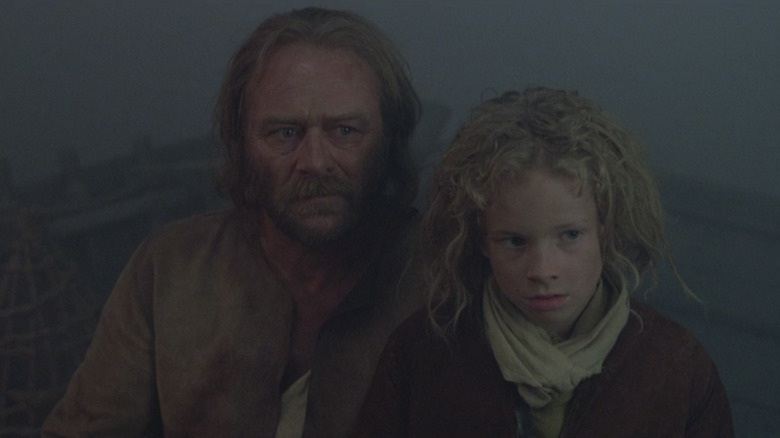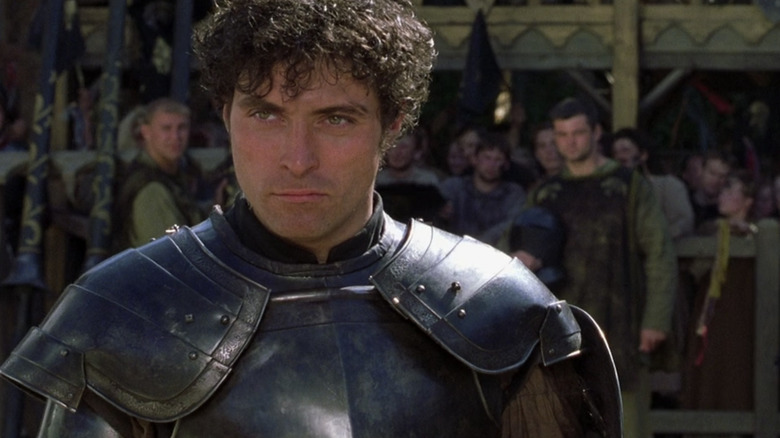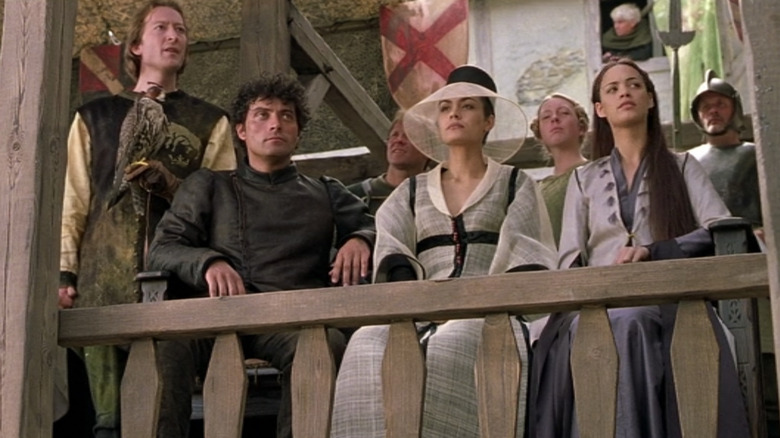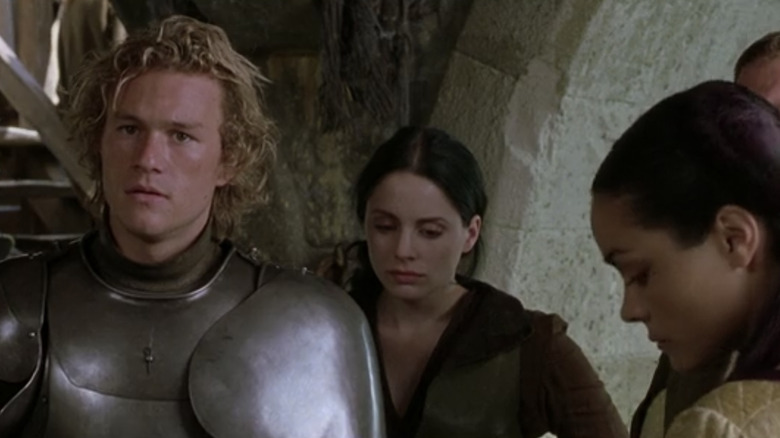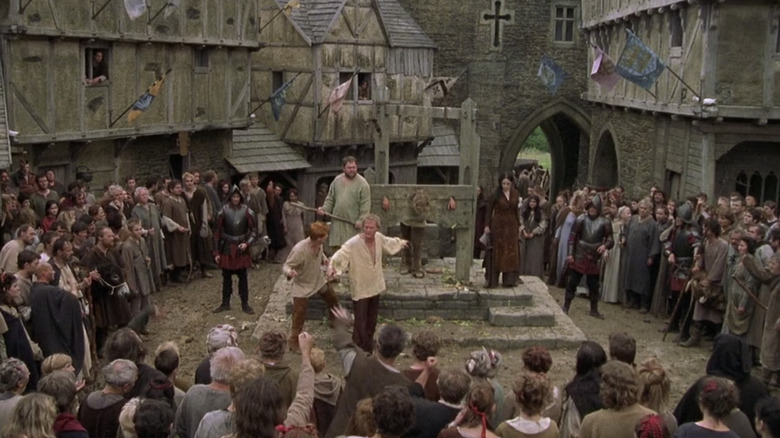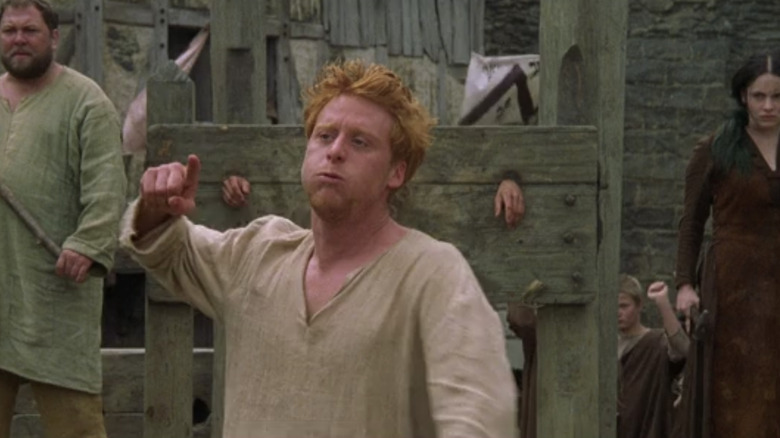Things Only Adults Notice In A Knight's Tale
Everyone can appreciate a good rags-to-riches story. Or, in the case of "A Knight's Tale," a peasant-to-knight narrative. Though this medieval passage is rated PG-13, some of its elements might land differently for children and adults.
The 2001 quasi-medieval adventure comedy-romance film follows a peasant named William Thatcher (Heath Ledger). Though he's a commoner, William poses as a knight and competes in jousting tournaments. He got his unique start after his master, Sir Ector (Nick Brimble), died right before a tournament finale. In an attempt to make his friends –– Roland (Mark Addy) and Wat (Alan Tudyk), Geoffrey Chaucer (Paul Bettany) and Kate (Laura Fraser) as well –– rich, William pretends to be "Sir Ulrich von Liechtenstein" from Gelderland. Yet, as with most comedy-romance movies, William falls for Jocelyn (Shannyn Sossamon), a lady of noble birth.
William desires to become the jousting world champion and end up with the girl of his dreams, all while being a peasant who poses as a knight. Talking about having your cake and eating it too. This medieval masterpiece is sprinkled with a plethora of movie magic and everything works out for William by the movie's end. Throughout William's adventure, there are plenty of elements that tend to go unnoticed by younger viewers. Here are the events only adults are likely to catch in this anachronistic tale about a peasant-turned-knight.
William Thatcher supposedly hasn't eaten in three days before his first jousting contest
The events of the 14th century were clearly different than they are now. As an example, didn't even know where they were going to find their next meal. If you weren't rich or born of noble blood, then your life was likely going to be a struggle. (In a way, this isn't too far off from the 21st century.) Nevertheless, at the beginning of the film, Wat and Roland have a brief conversation entailing that they haven't eaten in three days. This "fast" likely spans to William as well since they're all part of the same crew.
Yet William puts on his master's knight armor and takes his place in the tournament –– and against all odds, he wins. William has natural talent and he's a survivor. The movie makes a point about his toughness and fearlessness. But he hasn't gone through his jousting training yet and not eating for three days would, at the least, leave him extremely weak for the contest. We're not trying to nitpick right off the bat, but it's not hard for a more seasoned viewer to notice how implausible this situation is. A starving (and likely frail) William wins the tournament against tested (and likely full-bellied) knights. Hungry or not, this kicks off William's quest as a knight.
The legendary band Queen wasn't around during the 14th century
We're not saying children don't have the brainpower to recognize out-of-place music, but it's easier for more seasoned viewers to recognize that "A Knight's Tale" is anachronistic — meaning it has elements in the movie that belong to a different time.
Case in point: Before a jousting contest, the observers are clapping to "We Will Rock You" by Queen. Of course, they can't possibly know this song since it came out hundreds of years later, in the 1970s, as this movie's setting is during medieval times. Despite taking place during the Middle Ages, the film pumps in classic rock music and other out-of-place elements, giving it an anachronistic vibe and feel. If you're not looking for these aspects or don't read the film synopsis before watching "A Knight's Tale," then these elements are likely harder to recognize, no matter what age you are. Yet the spectators jamming to Queen is a dead giveaway –– well, at least to adults, that is.
William's only goal is to be the best, and this blindsides him
William wants to be the best jouster in the world. As many adults will recognize, when people are motivated and crave one goal in particular, they tend to put on blinders. Their decisions tend to revolve around this goal, and it can make it harder for them to enjoy the present moment.
William suffers from this curse. His main goal is to be the best and this ambushes his own happiness. Therefore, he doesn't allow himself to enjoy the magical run he's on, from peasant to knight to all-worldly jouster. He no longer has to worry about food because he's presumably wealthy, and he has a comfortable bed to sleep in at night, privileges he wasn't graced with at the beginning of his journey. William is focused on the prize while his companions are living in the moment and are grateful for how far along they've come. It all works out for William, but it's not hard for an adult to notice that things could have gone a lot worse for William and he could have ended up with nothing. He'll risk everything in an attempt to make his dreams come true.
Women were, to say the least, treated unfairly during the Middle Ages
It's not hard for a more seasoned viewer to notice how poorly women were treated during this time, an aspect that a more innocent mind might not yet grasp. For starters, only knights could compete in the jousting tournaments. In fact, only men could become knights. Continuing the unfair trend, Jocelyn is asked to keep her voice down when arguing with William inside, yet she questions why she has to be quiet and not William.
"A Knight's Tale" is aware that women were treated poorly. Before a tournament, all the competitors tell Jocelyn that they're going to win the entire thing for her as if this is an act of manly bravery that Jocelyn can't possibly pass up. Yet she's more interested in the quality of a person as opposed to the unimportant accolades they prioritize. She's attracted to William because he's different from the other knights.
Jocelyn telling William to lose on purpose is kind of unreasonable
Jocelyn asking William to prove his love by losing contests on purpose is a questionable ask. After all, jousting is a violent sport, and throwing a contest could lead to death. Not to mention that reputations during this time are worth everything, and losing could be costly.
Luckily, William isn't too badly injured when he lets other knights barrel into him. Jocelyn realizes that he loves her and then asks him to win to prove his love for her. We understand where she's coming from. As she wants William's actions to prove his fondness of her, not his words –– because countless men have told her that they'll win for her, but no one has ever lost for her. She wants proof that William is different. Yet William could have been seriously injured. Surely, there could have been another way to show that he loved her?
The Middle Ages were a brutal time. Date nights and romantic gestures weren't quite the same during the 14th century, we can only imagine. In this particular case, however, if William were to lose the tournament, then –– unknown to him –– he and his friends would have lost their money as they heavily bet on William to win it all.
Undeniable talent can take a person as far as they want to go
William Thatcher lives during an unfair time –– if you're not of noble descent, then the world is limited. A person can presumably never be king, or in this case, even a knight. Yet a knight is all William wants to be. His father, John Thatcher (Christopher Cazenove), gives him away to another family to try to rewrite his lineage and future story. Yet if William weren't talented, all of that would have been for nothing.
Because William is the best jouster in the entire world, he's rewarded with fame, riches, and even the girl of his dreams. If he never would have disguised himself as a knight with a noble name, he wouldn't have had the opportunity to be in Jocelyn's presence. Yet if he weren't talented, he wouldn't have stood out and his knight career would have ended faster than it started. Adults watching will likely agree with this sentiment: If someone has undeniable talent, which William does, then that person can go as far as they want to go. But perseverance is the magic that puts it all together, which William has in spades.
Count Adhemar isn't in the wrong for ratting out William
Although Count Adhemar (Rufus Sewell) is kind of a coward for ratting out William for not being who he says he is, Adhemar isn't necessarily in the wrong. The world championship is a tournament for knights and William, at that time, isn't yet a knight. During these times, Adhemar has every reason to be upset, although a 21st-century mindset wouldn't agree with his actions as the qualifications for becoming a knight were a little iffy to begin with.
Yet more seasoned viewers can also empathize with the villainous Adhemar, as he's not exactly wrong. William doesn't become a knight until Sir Thomas Colville/Edward the Black Prince (James Purefoy) knights him. Adhemar is painted a monster, and if he were cheating or lying about who he was, audience members would want him to be disqualified. But luckily, William becomes a knight just in time to beat Adhemar and become the world champion.
Adhemar and William are essentially rivals because they both like the same woman
Adhemar, like the other head-over-heels knights, wants to be with Jocelyn as she's beautiful and a lady of noble birth. We're not saying she's not worth fighting for, but adults will notice how petty the beginning of Adhemar and William's rivalry is. They virtually become rivals because they're both infatuated by Jocelyn.
That rivalry boils over when Adhemar beats William in a jousting tournament –– and then William's main goal is to not only become a world champion but to beat Adhemar while doing so. The rivalry intensifies with Adhemar's actions, his smugness, and his overall makeup. By the film's end, it's hard not to cheer for William to defeat Adhemar, yet an adult won't soon forget that these men couldn't set aside their differences –– and their rivalry started because they both admired Jocelyn. They made it seem like the winner would win her heart, yet Jocelyn is the only person who should have a say in who she ends up with.
William is great, but he's also kind of selfish
Yes, William is the hero of this story. But a more mature viewer will also notice that he's pretty selfish. Although it works out in the end, he puts his friends' lives at risk by not running away once Adhemar discovers that he's lying about his nobility. During these times, people were put to death for lesser crimes. William's entire supporting cast encourages him to run — yet, being the stubborn person that he is, he decides to show up for the jousting contest anyway. To the surprise of nobody, he's captured and imprisoned.
In a worst-case scenario, William could have been sentenced to death, along with Roland, Wat, Geoffrey Chaucer, and even the sweet Kate. And it would have all been because William wanted to beat Adhemar and become the best jouster on the planet. Now, just to prove we're not picking on William, we'll say that William changed all of his friends' good luck and fortunes as he shared his wealth and the stage with them. That, in itself, is admirable. We're 100 percent on Team William, but the knight doesn't come without his faults.
The townspeople make a head-scratching decision
The townspeople immediately turn against William when it's revealed that he's not actually a knight. William is then placed in a pillory in the open for the public to shame him, and they proceed to throw vegetables at him. Not only is this extremely dehumanizing, but adults will also realize that these people are probably starving. Not everyone had an abundance of resources during this time, especially not fruits and vegetables.
Even if these people were given the vegetables to throw at William, one would think they'd opt to keep them. While knights and noble people had extravagant feasts, many of the commoners struggled to get from one meal to the next, so it makes no sense that the townspeople would just throw food away. This is especially true after William, a commoner, started the movie by saying he hadn't eaten in three days.
William has the best supporting cast
Although this film is titled "A Knight's Tale," William's supporting cast are the real heroes. They stand by William no matter what, even when their own lives are in danger. Kate even pioneers a lighter yet stronger armor for William. She also helps William with his love life. In fact, Wat, Roland, and Geoffrey Chaucer assist William with writing love letters to Jocelyn as well.
While William is the hero of this story, it's evident –– and easier for an adult to spot –– that, despite William being a talented jouster, if he didn't have a strong supporting cast, he wouldn't have made it as far as he did. A good supporting cast, whether it be in a movie or in a real life setting, is one of the keys in life.
Ultimately, "A Knight's Tale" ends on a triumphant note for William –– not so much for Adhemar, who's knocked off his horse by William in the final jousting contest. The film's underlying messages might land differently for kids and adults, but all viewers are united in appreciating a tale about a persevering knight.
